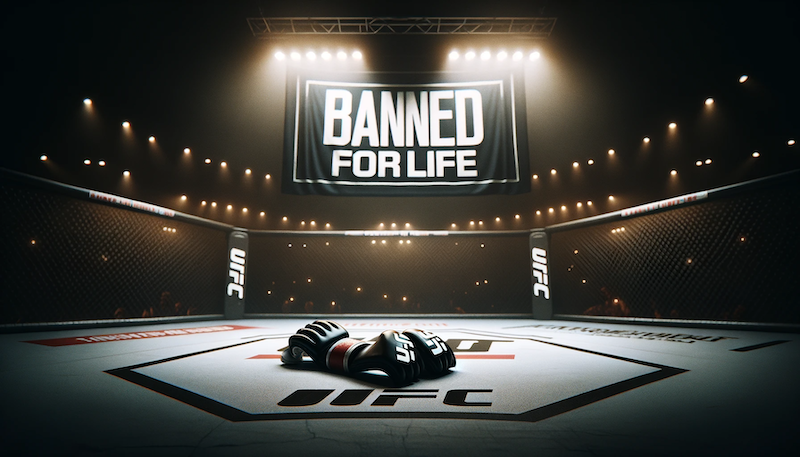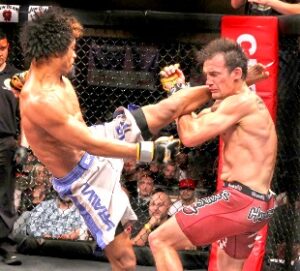
The world of the UFC is as thrilling as it is unpredictable. Over the years, we’ve seen fighters rise to the highest points in their life and others to their lowest.
In this article, we dive into the stories of fighters who’ve been banned from the UFC for life, exploring the reasons behind their bans and their paths post-UFC.
Contents
- Banned UFC Fighters: Full List (15 Life Bans)
- 1. War Machine (Banned in 2008)
- 2. Kalib Starnes (Banned in 2008)
- 3. Paul Daley (Banned in 2010)
- 4. Maiquel Falcao (Banned in 2011)
- 5. Jason Miller (Banned in 2012)
- 6. Rousimar Palhares (Banned in 2013)
- 7. Matt Riddle (Banned in 2013)
- 8. Randy Couture (Banned in 2013)
- 9. Jason High (Banned in 2014)
- 10. Thiago Silva (Banned in 2014)
- 11. Cody East (Banned in 2016)
- 12. Wanderlei Silva (Banned in 2016)
- 13. Ruslan Magomedov (Banned in 2019)
- 14. BJ Penn (Banned In 2019)
- 15. Darrick Minner (Banned in 2022)
Banned UFC Fighters: Full List (15 Life Bans)
In date order, here’s the full list of UFC fighters who were banned from the promotion for life.
1. War Machine (Banned in 2008)
War Machine, born Jonathan Koppenhaver, experienced a tumultuous and ultimately tragic UFC career that saw him released in 2008.
He was released from the UFC after refusing a fight proposed by UFC matchmaker Joe Silva. Additionally, his controversial comments regarding the death of fellow UFC fighter Evan Tanner contributed to his release.
However, it was his conviction of assaulting his ex-girlfriend, Christy Mack, that led to a permanent and more notorious ban from the UFC. He’s also currently serving a life sentence in prison as a result of the assault.
2. Kalib Starnes (Banned in 2008)
Kalib Starnes is a Canadian MMA fighter who appeared on The Ultimate Fighter 3 and had a brief and controversial stint in the UFC. He was banned for life from the UFC after his performance against Nate Quarry at UFC 83 in 2008.
During the fight, Starnes engaged in evasive tactics, spending 3 rounds actively avoiding engagement with Quarry by running around the Octagon. This strategy led to him being nicknamed ‘The Running Man’.
After the fight, Starnes was released by the UFC. Dana White said, “He just doesn’t belong in the UFC and after his performance the other night, he should consider a new line of work.”
Dana White’s advice was ignored, and Kalib Starnes bounced from one MMA promotion to the next until his retirement in 2016. Most notably, he fought for the AFC.
3. Paul Daley (Banned in 2010)
Paul Daley’s UFC career ended abruptly after he sucker-punched Josh Koscheck after the bell at UFC 113 (2010).
He was angry about losing the fight and for all the trash talk that happened in the lead-up to the fight. After the fight, he gave the hilarious excuse that he hadn’t heard the bell – a blatant lie.
Despite success in other promotions like Strikeforce and Bellator, Dana White’s words, “He will never fight in the UFC again,” have held true, marking a permanent end to his UFC journey.
4. Maiquel Falcao (Banned in 2011)
Shortly before his upcoming fight against Tom Lawlor at UFC 134, Maiquel Falcao was released and banned for life by Dana White after details emerged about his involvement in a violent altercation outside a nightclub in 2002.
When explaining his stance on the matter, Dana White said, “Sexual assault, hitting a woman or anything like that, you’re gone from the roster. It doesn’t matter if you’re a winner or a champion or anything like that. You’re gone.”
Despite his legal challenges, Falcao was able to continue his career in Bellator MMA, KSW (Konfrontacja Sztuk Walki), and lesser-known MMA promotions.
5. Jason Miller (Banned in 2012)
Jason ‘Mayhem’ Miller, a fighter known for his fiery personality and appearances on “Bully Beatdown”, faced a controversial end to his UFC career.
Miller’s last UFC fight was against C.B. Dollaway on May 26, 2012, at UFC 146. After losing the bout, Miller was involved in an undisclosed backstage incident that led to his release and ban from the UFC.
UFC President Dana White, referring to this incident, stated, “Something happened here backstage after. Mayhem’s done, he’s gone.”
Dana White wouldn’t go into the details of the incident, but Miller had allegedly called a bartender the C word after she refused to give him a free drink.
Following his ban from the UFC, Miller’s life has been marked by a series of legal troubles.
He has faced multiple arrests and charges, including domestic violence, vandalism, assaulting officers of the law, battery and assault, driving under the influence, and trespassing.
6. Rousimar Palhares (Banned in 2013)
Rousimar Palhares, known for his grappling prowess, was banned for unsportsmanlike conduct inside the cage. Despite his talents, Palhares’ refusal to release submission holds led to his UFC dismissal.
His first offense was in 2010 at UFC 111, when he caught Tomasz Drawl in a knee bar and wouldn’t let go until the referee physically pulled him off, despite Drawl having already tapped.
He was given a 3-month suspension but pulled the same stunt at UFC Fight Night 29 against Mike Pierce in 2013. This time he held onto a heel hook submission until the referee intervened, despite Pierce tapping multiple times.
After the fight, Dana White released Palhares from the UFC and it was obvious that he’d never be allowed to rejoin the promotion.
Palhares continued competing elsewhere but remains infamous for his actions in the UFC.
7. Matt Riddle (Banned in 2013)
Matt Riddle was released from the UFC in 2013, not only due to multiple positive tests for cannabis but also because of his controversial comments about his use of the substance.
Riddle’s statement in an interview, where he mentioned smoking weed “so that I don’t beat my children,” was met with significant backlash, particularly from UFC President Dana White.
White’s response was stern and direct, as he expressed at the UFC 158 pre-fight press conference, calling Riddle a “moron” and citing his behavior and comments as the reasons for his release and ban.
Following his departure from the UFC, Riddle transitioned to a career in professional wrestling, joining WWE, where he’s found considerable success.
8. Randy Couture (Banned in 2013)
Randy Couture, a legendary figure in MMA, faced a significant fallout with the UFC due to his perceived disloyalty.
This tension escalated after Couture retired and signed a contract with Spike TV, closely associated with Bellator, UFC’s main competitor. Dana White took Couture’s move as a personal betrayal.
In 2013, this led to a ban on Couture from cornering his son, Ryan Couture, in a UFC bout. White’s stance was so firm that he stated Couture couldn’t even purchase a ticket to a UFC event.
Despite this ban, Couture remained active in the MMA world. He took on a role in Spike TV’s Fight Master, aligning himself further from the UFC.
His involvement in this and a notable movie career showcased his continued influence in and out of the sport, albeit outside the UFC’s domain.
9. Jason High (Banned in 2014)
Jason High’s UFC career ended under controversial circumstances at UFC Fight Night 42 (2014) where he faced Rafael dos Anjos.
After a defeat by TKO, High stood up to dispute the referee’s decision to end the bout, and in a moment of heightened frustration, he pushed the referee.
This act of misconduct directly contravened the professional standards expected within the UFC and led to his immediate release and lifetime ban.
Following his departure from the UFC, High continued his career in other MMA promotions such as the PFL and AFC.
10. Thiago Silva (Banned in 2014)
In February 2014, Silva was arrested after a series of events involving his ex-wife, Thaysa Kamiji, and her then-partner, Pablo Popovitch, a renowned jiu-jitsu instructor.
Silva drove to Popovitch’s jiu-jitsu school armed with a gun, where he threatened to kill both Kamiji and Popovitch.
This alarming incident led to a SWAT team being called to Silva’s residence, where he was eventually taken into custody.
Dana White immediately banned Silva from the UFC, but soon reinstated him as the charges against Silva were later dropped due to inconsistencies in witness testimonies and a lack of evidence.
Despite this, Silva’s return to the UFC was short-lived. New evidence, including a video allegedly showing Silva in an earlier assault, surfaced, leading to his final release from the UFC.
11. Cody East (Banned in 2016)
Despite his troubled past, which included multiple arrests in 2006, 2008, and 2010 for charges such as domestic violence and child abuse, the UFC gave Cody East a chance when they signed him in 2016.
However, this opportunity was short-lived due to the continuation of his legal troubles, which continued to resurface after signing for the UFC.
While specific details of the 2016 charge that led to his UFC ban are not explicitly documented, it’s known that his history of domestic violence and child abuse played a significant role in the UFC’s decision to release him.
Since he departed from the UFC in 2016, East has largely stayed away from the mainstream MMA spotlight. His career post-UFC has been relatively low-key, with minimal presence or notable achievements in major MMA promotions.
12. Wanderlei Silva (Banned in 2016)
Wanderlei Silva was handed a lifetime ban in 2014 by the Nevada State Athletic Commission (NSAC) due to his failure to take a mandatory substance abuse test and his neglect to apply for a fighting license in Nevada.
This incident marked a major point of contention in Silva’s career and his relationship with the UFC. However, in 2015, this lifetime ban was overturned by a Nevada district court judge.
Despite the overturning of the ban, Silva’s relationship with the UFC had been irrevocably affected.
Legal disputes, particularly Silva’s allegations that the UFC had fixed fights, further strained any remaining ties and saw him banned in 2016.
Post-UFC, Silva continued his career in MMA but outside the UFC’s purview. He remained a prominent figure in the sport, competing in organizations like Bellator MMA and Rizin Fighting Federation.
13. Ruslan Magomedov (Banned in 2019)
Ruslan Magomedov’s UFC career was ended by issues related to doping violations. His repeated failures in drug tests under the United States Anti-Doping Agency (USADA) led to severe consequences.
In the fall of 2018, Magomedov encountered his third failed doping test as a result of taking anabolic steroids and PEDs, which was a critical blow to his standing in the UFC.
The situation escalated further when, in February 2019, he refused to take another required test. This refusal ultimately resulted in a lifetime ban from the UFC.
Following his release from the UFC, Magomedov continued his professional fighting career by signing with the Russian Absolute Championship Akhmat (ACA) promotion.
14. BJ Penn (Banned In 2019)
BJ Penn, a UFC legend, saw his career in the promotion come to an end in 2019. His exit wasn’t due to an in-Octagon performance but was due to his street fighting in Hawaii.
This behavior, particularly the public nature of these incidents, prompted UFC President Dana White to intervene directly.
On September 5, 2019, Dana White announced to ESPN that Penn would no longer be allowed to compete in the UFC, stating decisively, “He won’t fight again, that’s it. That’s a wrap.”
BJ has since retired and has occasionally appeared in MMA-related events and interviews, sharing his insights and experiences.
15. Darrick Minner (Banned in 2022)
Darrick Minner found his career in the organization come to an abrupt end in 2022 due to a betting scandal involving his coach, James Krause.
The controversy erupted following UFC Fight Night 214 (2022), where Minner faced Shayilan Nuerdanbieke. During this bout, Minner suffered a knee injury in the first round, leading to a TKO victory for Nuerdanbieke in just over a minute.
It was later revealed that Minner had an undisclosed knee injury at the time of the fight, which likely contributed to his quick defeat (or so they made it appear this way).
However, the real issue arose from suspicious betting line movements before the fight. There was a significant shift in the odds, with Minner becoming a large betting underdog just hours before the bout.
This raised concerns that Minner’s team, aware of his injury, may have exploited this information for financial gain by betting against him.
The Nevada Athletic Commission (NAC) responded by suspending Minner and Krause indefinitely, which led to Minner’s permanent release from the UFC.




